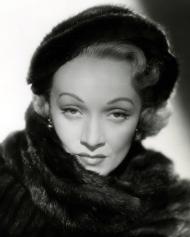Ki randizott Yul Brynner-szel?
Marlene Dietrich Yul Brynner dátummal kelt, ? és ?. között A korkülönbség 18 hónapig és 6 napig tartott volt.
Yul Brynner

Yul Brynner (Vlagyivosztok, 1920. július 11. – New York, 1985. október 10.) Oscar-díjas és Tony-díjas orosz származású amerikai színész.
Legismertebb szerepei a sziámi király alakítása A király és én című Richard Rodgers-musicalben színpadon és a filmvásznon, II. Ramszesz szerepe Cecil B. DeMille 1956-ban készült Tízparancsolat című filmjében, illetve Chris Adamsé A hét mesterlövész című klasszikus westernfilmben.
Gazdag, mély hangjáról volt ismert és kopaszra borotvált fejéről. Utóbbira A király és énben játszott szerepéhez volt szüksége, de aztán megőrizte mint „védjegyet”. E szerepe miatt Hollywoodban „a Király” becenéven volt ismert.
Bővebben...Marlene Dietrich

Marie Magdalene "Marlene" Dietrich (, German: [maʁˈleːnə ˈdiːtʁɪç] ; 27 December 1901 – 6 May 1992) was a German-American actress and singer whose career spanned nearly seven decades. In 1920s Berlin, she performed on the stage and in silent films. Her performance as Lola Lola in Josef von Sternberg's The Blue Angel (1930) brought her international acclaim and a contract with Paramount Pictures. Dietrich starred in many Hollywood films, including six roles directed by Sternberg: Morocco (1930) (her only Academy Award nomination), Dishonored (1931), Shanghai Express and Blonde Venus (both 1932), The Scarlet Empress (1934), The Devil Is a Woman (1935). Throughout World War II, she was a high-profile entertainer in the United States. Although she delivered notable performances in several post-war films, including Billy Wilder's A Foreign Affair (1948), Alfred Hitchcock's Stage Fright (1950), Billy Wilder's Witness for the Prosecution (1957), Orson Welles's Touch of Evil (1958), and Stanley Kramer's Judgment at Nuremberg (1961), she spent most of the 1950s to the 1970s touring the world as a marquee live-show performer.
Dietrich was known for her humanitarian efforts during World War II, housing German and French exiles, providing financial support and advocating their American citizenship. For her work on improving morale on the front lines during the war, she received various honors from the United States, France, Belgium, and Israel. In 1999, the American Film Institute named Dietrich the ninth greatest female screen legend of classic Hollywood cinema.
Bővebben...